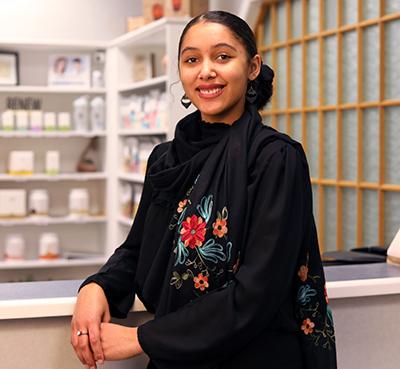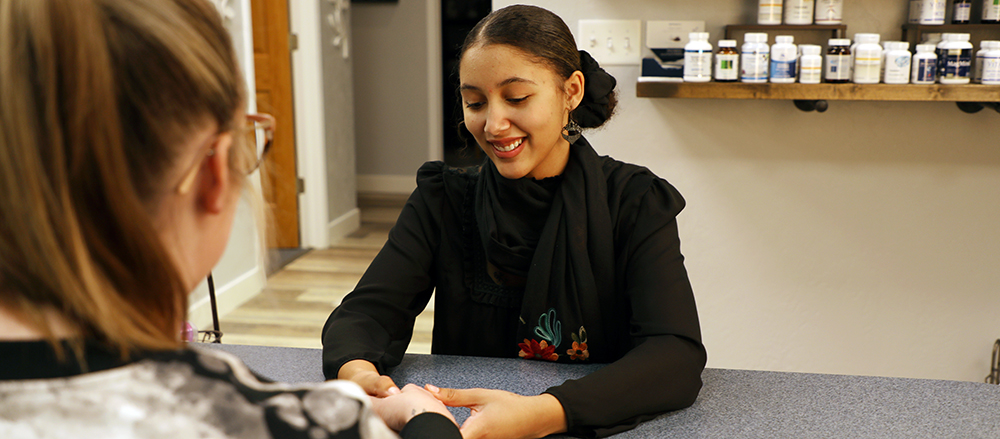
MINOT, N.D. – Alayzia McLeod has always had a plan for her postsecondary education, but as usual, plans change. Instead of adapting her plan to fit Minot State, she made Minot State fit for her.
“I just really like the home feeling I get here. I was born here, and my mom went here for a few years. I always saw it driving on Broadway, and I thought, ‘I'm going to go there,’” she said. “Once I got older, I did wonder, ‘what if I went somewhere else?’ to see a different state experience, new life experiences, but no, I was still drawn here.”
McLeod set her sights on dermatology when she first attended MSU in fall 2019.
“My initial choice of being a music major was due to my interest in music,” she said, “and the fact that medical schools are over saturated with science majors in biology, chemistry, etc., so they look for other well-rounded candidates.”
Within her first year, McLeod’s interests pivoted towards holistic medicine. Because marketing herself is a top priority, she changed her degree to a Bachelor of Individualized Studies (BIS) in Spanish language and pre-medical sciences.
“With holistic healthcare, the focus is on the entire patient — mind, body, and lifestyle. Conventional medications and practices are of course valuable and important, but I also think that people should have the resources to healthy living through natural means as well,” she said. “I decided to change my major to something that aligned better with my career goals but still allowed me to stand out as a candidate for applying to graduate school.”
The BIS degree includes three interdisciplinary studies classes — an introduction (IDS 240), a directed project (IDS 360), and a senior capstone (IDS 480) — in addition to those for the student’s fields of interest.
“In IDS 240, students are introduced to what interdisciplinary studies encompass,” said Director of Interdisciplinary Studies Sophia Rammel. “In this course, they design their academic plan, which is essentially the degree requirements they will complete to graduate. It is tailored to their interests, and they work with faculty members from each area of study to decide which classes they should take.
“IDS 360 offers students the chance to complete an interdisciplinary project related to their chosen focus areas. This project can take on many forms, like a research project, a creative work, or a service-learning project, to name a few. IDS 480 gives students an opportunity to present their directed project from IDS 360 to their peers, faculty, and the broader campus community.”
“I love that I'm getting to decide what courses I'm going to take and how they’re going to benefit me for my career,” said McLeod. “With Spanish, my first thought was the fact that it makes me a little more marketable, looks good on my resume. It's good for jobs, it's great for going on to graduate school, and it gives me the opportunity to travel abroad. Then with the pre-medical sciences, I'm actually taking a pre-med approach but for more holistic medicine.”

A BIS is different than a Bachelor of General Studies because it requires students, like McLeod, to have a plan from the beginning. This plan must be approved by the Interdisciplinary Studies Advisory Council.
“First, the interdisciplinary board evaluates if the proposed topic of study exists on campus or not,” Rammel said. “Then we assess the connections that the student is able to make between disciplines. In Alayzia’s case, she explained why she needed the Spanish language combined with her coursework in pre-medicine. The connection between the two fields was readily apparent, because speaking more than one language will allow Alayzia to communicate with more patients and will increase her job opportunities after graduation.”
Being in her third year on campus, McLeod has already completed her directed project, having completed an internship with a naturopathic doctor and currently working in a natural health shop.
“I got to job shadow with her this past summer, and I got to experience first-hand what it's like to get acupuncture, why people come in for acupuncture, other ways to deal with certain illnesses without having to take medication,” McLeod said. “I got to sit in during consultations and hear about unique illnesses. I heard a lot about endometriosis as well as hyperandrogenism, so thyroid issues. I got to hear about different ways of not curing, but helping alleviate pain when it comes to those types of things.
“I also started working in a natural health shop, so I work with supplements and things like that. I took those experiences, and I wrote them in a journal for proof of what I did, and I translated that journal into Spanish.”
McLeod will earn even more experience in the summer of 2022 when she studies abroad.
“I'm going to San Jose, Costa Rica to do a holistic course that they have, which is in English, but I also plan to do Spanish for healthcare professions while I'm there,” she said. “Once again, I'll be incorporating basically both sides of my degree while immersing myself in the Spanish language on top of other communication skills.”
While her path did change once she started college, the BIS made it easy for McLeod to piece together each part of her plan.
“It came down to me wanting to graduate on time while still receiving the education that I would be fully invested in,” McLeod said. “Being able to do the BIS has helped me to stay on track and have a well-rounded education that I otherwise may not have gotten if I were to take a standard track and still graduate on time.”
About Minot State University
Minot State University is a public university dedicated to excellence in education, scholarship, and community engagement achieved through
rigorous academic experiences, active learning environments, commitment to public service, and a vibrant campus life.
Published: 12/03/21




